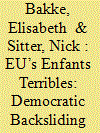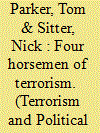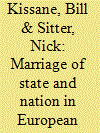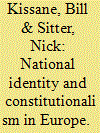|
|
|
Sort Order |
|
|
|
Items / Page
|
|
|
|
|
|
|
| Srl | Item |
| 1 |
ID:
184251


|
|
|
|
|
| Summary/Abstract |
In the academic literature, Hungary and Poland are often cited as paradigmatic cases of democratic backsliding. However, as the backsliding narrative gained traction, the term has been applied to the rest of the post-communist region, including the Czech Republic and Slovakia. We suggest that this diagnosis is in part based on conceptual stretching, and set out to rescue the concept as an analytical tool. We then assess the extent of backsliding in the four Visegrád countries, explaining backsliding (and the relative lack of it) in terms of motive, opportunity, and the strength or weakness of opposing or constraining forces. We conclude that the situation is not as desperate as some commentators would have it: democratic backsliding in Hungary and Poland was contingent on a few exceptional factors, and EU leaders therefore need not be paralysed by the fear of contagion when they contemplate forceful action against backsliding member states.
|
|
|
|
|
|
|
|
|
|
|
|
|
|
|
|
| 2 |
ID:
144919


|
|
|
|
|
| Summary/Abstract |
David Rapoport's concept of Four Waves of terrorism, from Anarchist terrorism in the 1880s, through Nationalist and Marxist waves in the early and mid-twentieth century, to the present Religious Wave, is one of the most influential concepts in terrorism studies. However, this article argues that thinking about different types of terrorism as strains rather than waves better reflects both the empirical reality and the idea that terrorists learn from and emulate each other. Whereas the notion of waves suggests distinct iterations of terrorist violence driven by successive broad historical trends, the concept of strains and contagion emphasizes how terrorist groups draw on both contemporary and historical lessons in the development of their tactics, strategies, and goals. The authors identify four distinct strains in total—Socialist, Nationalist, Religious, and Exclusionist—and contend that it is possible to trace each strain back to a “patient zero” active in the 1850s.
|
|
|
|
|
|
|
|
|
|
|
|
|
|
|
|
| 3 |
ID:
127670


|
|
|
|
|
| Publication |
2013.
|
| Summary/Abstract |
The comparative study of civil war has recently gone through a "structural turn," towards large-n quantitative studies that explain the variation in the incidence of civil wars in terms of structural factors. The alternatives have been a return to case studies and a constructivist critique that emphasizes the role of ideas in conflict. While there is no a priori reason to reconcile these approaches, it remains a practical task for those who want to understand how a given social situation escalates into civil war. After reviewing the two poles in the debate, we mine the literature on nationalism for insights into this issue.
|
|
|
|
|
|
|
|
|
|
|
|
|
|
|
|
| 4 |
ID:
095084


|
|
|
|
|
| Publication |
2010.
|
| Summary/Abstract |
This article maps out the role played by national identity in modern European constitutions. It does this by comparing its impact on constitutions across Gellner's time zones of European nationalism, and shows how the impact of nationalism has increased gradually over time, and is now strongest in Central and Eastern Europe. It concludes with a reflection on why this has been the case, and why constitutional politics have increasingly lent themselves to nationalist influences in the modern era.
|
|
|
|
|
|
|
|
|
|
|
|
|
|
|
|
| 5 |
ID:
095080


|
|
|
|
|
|
|
|